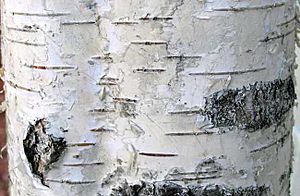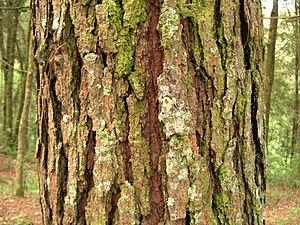Lenticel facts for kids
A lenticel is a special kind of tiny pore found on the bark of trees and other woody plants. Think of them as small breathing holes! They help the plant exchange gases with the air, just like our lungs help us breathe.

What Are Lenticels?
Lenticels are made of spongy tissue. This tissue has lots of tiny spaces between its cells. These spaces allow air to move in and out of the plant's inner layers. You can find lenticels on the stems and roots of many flowering plants. They are especially common on trees.
Lenticels have been around for a very long time. Scientists have found them on woody plants that lived during the Carboniferous period. These early lenticels helped those ancient plants breathe too.
How Lenticels Work
The bark of a tree is usually very tough. It doesn't let much air through. Lenticels act like tiny windows or vents. They let gases like oxygen and carbon dioxide pass through the bark. This gas exchange is super important for the plant to stay healthy and grow.
The name 'lenticel' comes from its shape. They often look like tiny lenses. This lens-like shape is one of the ways people can identify different types of trees. Each tree species can have slightly different looking lenticels.
Images for kids
-
Lenticels on Prunus serrula
-
Lenticels on potatoes of the Monalisa variety
-
Lenticels on Williams pear varieties
See also
 In Spanish: Lenticela para niños
In Spanish: Lenticela para niños
 | Emma Amos |
 | Edward Mitchell Bannister |
 | Larry D. Alexander |
 | Ernie Barnes |








